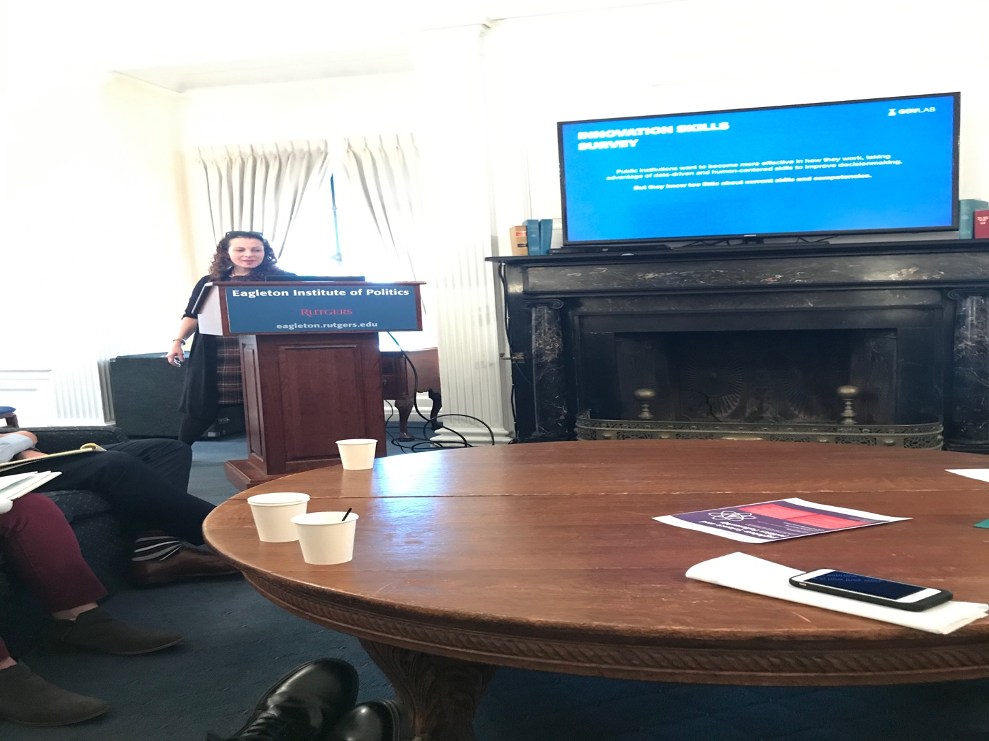Author: Brian Canter “Better outcomes for new methods will lead to more trust of new institutions.” This was my major takeaway from hearing Beth Noveck speak in November at the Eagleton Institute of Politics. The event was part of the Eagleton Science and Politics Initiative and was titled Where Science, Innovation and Civic Engagement Meet. Dr. Noveck is New Jersey’s first Chief Innovation Officer and runs the GovLab affiliated with New York University (NYU). She leads a team whose mission is to “strengthen the ability of institutions and people to work more openly, collaboratively, effectively and legitimately to make better decisions and solve public problems.” The core argument of the GovLab is that in improving institutions, first, the individuals working in those institutions must be trained in new ways to solve problems. The first step in creating change is problem identification, like conducting scientific research. Crucially, in identifying the problem, one must talk to those individuals being affected by the problem. Biomedical research has also incorporated this concept through the creation of the Patient-Centered Outcomes Research Institute, which includes patients in the decision-making process. This idea of working to solve problems, with the individuals being affected, is known as human-centered design. Unlike in scientific research, there are no randomized clinical trials for policies and government intervention. Data is necessary for the groups like the GovLab to solve problems, but Dr. Noveck also emphasized the need for her team to be skilled in problem solving by listening to people. Therefore, it becomes imperative to facilitate a sundry of experts from academia, industry, and policy when solving problems faced by public institutions. However, it’s also necessary to include those civil servants who must serve the public. A seminal report coauthored by Noveck this past August detailed the need for human centered design in reforming Australia’s public sector. The report surveyed over 400 Australian public employees who, while open to innovation and change, did not have the resources to implement changes. Public employees had a high interest in coaching and mentoring, yet often received neither. A minority of public servants had the skills needed to be innovative, and reported that they used the skills frequently. Noveck and her coauthors encouraged public institutions to consider their employees needs and equip them with data driven, participatory methods to tackle the challenges of the 21st Century. Noveck has been working as Chief Innovation Officer for only eighteen months. Yet during the event, she mentioned countless examples of projects she and her team were working on, or planning to work on, here in New Jersey. The first project she mentioned was the ENJINE challenge, an initiative that elicited innovative ideas from New Jersey state government employees. The initiative resulted in over 2000 state employees from twenty different departments and agencies submitting over 300 reforms. Some of the top ideas, as voted on by state employees, were allowing for telecommuting and working from home, implementing blockchain and smart contract technology, workplace fitness and wellness, and workplace childcare. A second initiative Dr. Noveck has spearheaded is the NJ Skills Accelerator. The project provides an online learning program for NJ state government employees to acquire ten innovation skills. These skills include human-centered design, an introduction to open data, and developing experiments for change. State employees can complete the modules at their own pace. Following completion of the modules and a self-assessment, civil servants will be able to submit projects of their own through the Office of Innovation. Dr. Noveck also mentioned there are several problems the Office of Innovation has not yet fully addressed. One major issue is tackling the problem of long-term unemployment in New Jersey. Nearly one out of every three unemployed New Jersey residents has been unemployed for more than twenty-seven weeks. The state has one of the highest rates of long-term unemployed residents. While Dr. Noveck noted an online toolkit had been developed for this group of people, she also noted that reading a website may not be sufficient for this group of people to find jobs. Instead she will focus on understanding the needs of the long-term unemployed population, and see what has been done by other public institutions to combat this chronic problem. Another challenge faced by Dr. Noveck and the Office of Innovation is a return on investment. Government officials are desperate to know what the Office of Innovation will produce in terms of outputs. This is the same demand scientists face from grant funding agencies, foundations and charities. The Office of Innovation combines the spirit of entrepreneurship with the critical thinking skills from science to make government better positioned to carry out its mission of better serving the residents of New Jersey. Following the event Dr Noveck patiently spoke with any attendees who wanted to connect and had questions. Before she was hustled into a car and dialing into an NYU faculty conference call, I had a chance to briefly chat with her. We discussed how her message of working for and with organizations that are mission based resonated strongly with me. I told her about Science Policy and Advocacy at Rutgers, a student run science policy group that I co-lead, and she was excited to hear that early career scientists are extending scientific thinking outside of the lab and classroom. I’m excited to see what the future holds for Dr. Noveck and the Office of Innovation. She’s a shining example of how scientists and academics can better the world through collaborating and bettering public institutions. Improving public institutions and increasing the public’s trust in them will serve the scientific community. More trust in the public institutions funding science, means more trust in science. More trust in science makes our university, state and country better technologically equipped to deal with all the problems we will face in the future.  Senior Editor: Monal Mehta
Senior Editor: Monal Mehta
iJOBS Blog